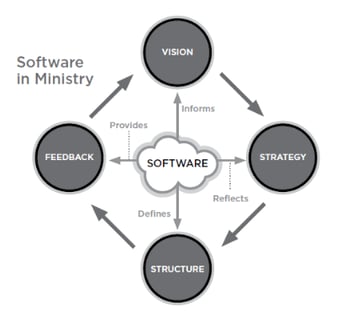 Yesterday, I did a workshop at the Southwest Small Groups conference in Las Vegas that my friend, Mark Howell, is hosting. The title of my workshop was Small Group Intelligence Software. I thought I would take a couple of weeks to share some of that content. Today, I'd like to consider the role of software in ministry. This diagram illustrates it well.
Yesterday, I did a workshop at the Southwest Small Groups conference in Las Vegas that my friend, Mark Howell, is hosting. The title of my workshop was Small Group Intelligence Software. I thought I would take a couple of weeks to share some of that content. Today, I'd like to consider the role of software in ministry. This diagram illustrates it well.
Ministry starts with a vision, an idea about what a church or ministry is called by God to accomplish. Initially, software has no impact on vision. This comes from leadership seeking the Lord and finding guidance from scripture. As the vision is executed, however, software should inform leadership on the progress of the vision so that adjustments can be made.
Vision naturally leads to the development of strategy. This is the plan for execution. It involves the development of concepts and language to align the organization around accomplishing the vision. At this point in the process, software is still passive. In our view, Church Management Systems should build in the flexibility to reflect the language and concepts of the strategy.
Next comes development of the structural components to carry out the strategy. This involves creating groups, classes, teams, processes, events and projects. It means allocating resources like money, facilities, time and people. Here's where software really begins to help. Software forces you to define structure because it requires you to create and resource each team, and identify their place in the organizational structure.
Finally, the most significant role of software is to provide feedback on how well the structure is carrying out the strategy. This obviously means reporting and communication. Having worked on building software for 17+ years, it has become crystal clear to me that it doesn't matter what software can do, it matters what people will do. In other words, you need to focus your time more on how you are going to get input into the system than you do on trying to get information out of the system. This is why we've worked so hard on and try to communicate clearly the importance of what I call "Response Access".
Responsive access is where small group intelligence begins. In the next blog we'll take a look at the progression of small group intelligence.



